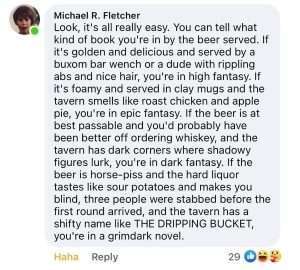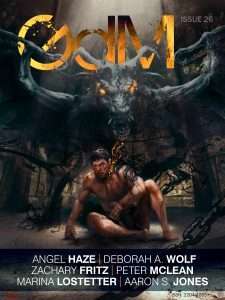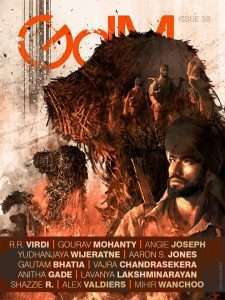Defining Grimdark Fantasy and SF: Moving to an Inclusive Future
Last Updated on July 15, 2024
Our team is committed to sharing our love of grimdark fantasy and science fiction in all media—be it books, film, TV or games—in the hopes that you might find a story you love. But, what exactly is grimdark and where does it situate itself relative to other speculative fiction?
Although it lacks a formal definition, the term “grimdark” is now commonly used to describe works of fantasy or science fiction that are particularly violent, dystopian, or amoral. The purpose of this essay is to reconsider this popularly held opinion of grimdark and propose a description that fits how we’ve seen it evolve over the years and where we see it now. The definition proposed herein represents the collective view of the Grimdark Magazine leadership team.
Previous Attempts to Define GrimdarkThe word “grimdark” originated from the tagline of the dystopian tabletop war game, Warhammer 40,000, which was introduced in 1987 and famously proclaimed: “In the grim darkness of the far future there is only war.” As detailed in our guide, Warhammer 40K: Where to Start Reading, the tabletop game has directly inspired a legion of books covering a wide range of sci-fi and fantasy action.
There have been several previous attempts to define grimdark. One of the more famous of these is the article by Mark Lawrence, author of the grimdark classic Prince of Thorns, in his 2017 periodically updated blog article, “Grimdark. We’re nailing it down!” Lawrence introduced a grimdark scale measured from 1 to 5, where 5 is the most grimdark. Quantification on this scale is achieved democratically by visitors to his website who can cast their vote about the level of grimdarkness in various books. The idea is that everyone brings their own personal bias about what constitutes grimdark, but following the wisdom of crowds, these individual variations should average out.
Currently, the #1 most grimdark book on Mark Lawrence’s scale is Beyond Redemption by Michael R. Fletcher, a gritty fantasy that delves deeper and deeper into darkness as the story progresses. Giving his own view on what constitutes grimdark, Fletcher points to clues from that seemingly ubiquitous fixture of fantasy: the tavern. Fletcher classifies different subgenres of fantasy based on characteristics of their tavern, arguing that a grimdark tavern reaches a putrid level of filth, with patrons who may be too busy stabbing each other to notice.

Source: Facebook
The gray morality depicted in grimdark stories, i.e., the moral ambiguity that governs characters’ motivations or actions, often implies that evil is a matter of perspective. Although grimdark stories are bleak, this does not mean they are without hope. Indeed, the best grimdark stories still provide a glimmer of that hope, something for which the protagonist would shout into the void, make their last stand, or cross moral boundaries. In our experience, people resonate with grimdark stories precisely because they provide that glimmer of hope in a brutally dark world.
Lawrence describes this well in his essay, “Groping the Elephant,” which eloquently describes the nature and importance of hope in grimdark fiction:
Grimdark is often called hopeless, but in doing so people miss that it isn’t apathetic – it is (for me) characterised by defiance in the absence of hope.
Grimdark is often called nihilistic, but this misses the idea that you can accept a nihilistic truth and still choose to die for a principle you know is an emotional construct.
A grimdark “hero” has a tendency to go all in – to burn their bridges even when they don’t need the warmth. They are, in their way, an allegory for hope, in so much as having been shown there’s no meaning in the world, they still cling to some elements of it. And in those choices they are revealed.
The way it’s painted by the disapproving you would think that grimdark fiction was the literature of surrender to the inevitable. When in truth it is the story of the battle against it – sharpened by the knowledge that there’s no ultimate victory to be had.
In addition to Lawrence’s argument that those who do not enjoy (or perhaps have not experienced) grimdark fiction see these stories as a surrender to the inevitable, Anna Smith Spark, in her 2019 article “Grimdark and Nihilism” takes this argument one step further, stating that grimdark’s version of nihilism, is in fact interpreted by fans of grimdark as hope.
Grimdark Magazine’s Definition
Understanding how brief life is, how easily all that one loves can be crushed out: with that understanding comes the desperate need to hold those things close. One fragile moment of happiness, of beauty … hold it tight to your heart and treasure it, for too soon it will be gone, all things die, all things fade, darkness comes and the light is so weak. The old lie, ‘Death or glory! Death! Death! Death!’ No: remember how fragile life is and how pointless, and cling on to life.
That thin pathetic line between rage and despair: that’s hope.
The voice screaming into the abyss: that’s hope.
Hold those you love close to you. Recognise that the world’s a cruel place.
Grimdark is that awareness. The reality of pain, the knife blade cutting in. And the determination to go on, keep on, fight on. There are no heroes, no certainty, there’s no bright shining prophecy of light. Just messed-up selfish wretched people trying to live their lives as best they can, trying to find something of love and happiness, trying to survive all the pain life brings. One single moment of beauty. One single glimpse of something good. A tiny perfect fragment in a damaged life.
Grimdark nihilism is hope, I think.
While Lawrence, Fletcher, and Smith Spark have given us clues about what constitutes grimdark, none of their approaches offers a formal definition. Here at Grimdark Magazine, we use the following definition when considering what we want to publish in our ezine, novellas, collections, and anthologies:
grimdark –
(noun) a bleak story with a glimmer of hope told in a hostile setting featuring morally gray characters;
(adjective) (of speculative fiction) characterized by a bleak story with a glimmer of hope, hostile setting, and morally gray characters.
Grimdark is often considered to be a subgenre of fantasy dating back to the 1984 publication of The Black Company by Glen Cook, which predates “grimdark” as a word. Although the term “grimdark” is most often applied to fantasy literature (see our list of Grimdark Fantasy: Where to Start Reading), the term is not restricted to fantasy but rather can apply to any form of speculative fiction, including fantasy, science fiction, horror, the supernatural, magical realism, historical fiction, and dystopian fiction. Rather than being a subgenre in itself, we consider grimdark as a crosscutting label that can be applied to any of these subgenres of speculative fiction. That is why Grimdark Magazine covers all forms of grimdark across genres and media.
 However, some people use the term “grimdark” as a pejorative for works that include gratuitous violence or promote nihilistic worldviews. This view of grimdark is unfortunate and, in our view, inaccurate. Grimdark does not imply a certain level of violence, and it most certainly does not imply gratuitous or sexual violence. Nor does grimdark imply the promotion of nihilism. In his essay, “The Future is Grimdark” author and Grimdark Magazine contributor Aaron S. Jones writes, “The darker the darkness is, the more powerful even the smallest ray of light becomes as it penetrates that darkness. And that’s what grimdark is. These stories are filled with a darkness that is soul-crushing and tormenting but then it offers a glimmer of light that keeps us going.”
However, some people use the term “grimdark” as a pejorative for works that include gratuitous violence or promote nihilistic worldviews. This view of grimdark is unfortunate and, in our view, inaccurate. Grimdark does not imply a certain level of violence, and it most certainly does not imply gratuitous or sexual violence. Nor does grimdark imply the promotion of nihilism. In his essay, “The Future is Grimdark” author and Grimdark Magazine contributor Aaron S. Jones writes, “The darker the darkness is, the more powerful even the smallest ray of light becomes as it penetrates that darkness. And that’s what grimdark is. These stories are filled with a darkness that is soul-crushing and tormenting but then it offers a glimmer of light that keeps us going.”
Jones notes that grimdark stories can resonate especially well with audiences when we are dealing with our own challenging times in history: “It brings people together and in the darkest of times, isn’t that what we need more than anything else? Grimdark stories can distract us from life, teach us about life, or just keep us alive at times. In dark times, grimdark can be the light that shines through.” Beyond books, Jones also notes the recent rise of grimdark in films and television during the contemporary landscape of war, famine, global warming, mental health, addiction, and a range of other factors impacting the globe’s first, second, and third world societies.
Once again referring to “Grimdark and Nihilism” by Anna Smith Spark, in this essay, the author also expands on this distinction between grimdark and nihilism, noting the inherent political dimension within much of grimdark fiction: “To me ‘grimdark’ is distinct from dark fantasy in that it has a very clear political dimension, a narrative cynicism that unpacks ideas like ‘leadership’, ‘power’, ‘good and evil’ and raises some uncomfortable questions about how we think about them. Grimdark asks questions about how power operates, uses fantasy to comment on huge issues of human morality and motivation, asks us to think a bit deeper about what we might do. It’s about cynicism, self-criticism, it’s actually very much a genre that criticises and politicises ‘righteous’ violence.”
Moving to an Inclusive FutureThe cultural importance of grimdark is shown by the diversity of authors writing works of grimdark fiction around the world. Grimdark has been used as a vehicle for telling stories of racial oppression, addressing issues of sexuality or gender identity, and coping with physical trauma or mental illness. Grimdark authors—and grimdark readers—come from all backgrounds. We believe that the diversity of the grimdark community is one of its greatest strengths, and that’s why we are delighted to feature content by authors from all walks of life.
 In addition to the authors who have formed the core of what grimdark fans have read over previous decades, a long list of powerfully diverse stories by authors who have helped grow grimdark beyond its generally European fantasy and American cyberpunk roots have helped grimdark reach far into fandom. Authors such as R.F. Kuang (The Poppy War) and Gourav Mohanty (Sons of Darkness) have showcased grimdark stories centred outside of western historical foundations, while authors such as C.L. Clark (The Unbroken), Lee Mandelo (The Woods All Black), and Tamsyn Muir (Gideon the Ninth) have brought LGBTQIA+ characters to the fore.
In addition to the authors who have formed the core of what grimdark fans have read over previous decades, a long list of powerfully diverse stories by authors who have helped grow grimdark beyond its generally European fantasy and American cyberpunk roots have helped grimdark reach far into fandom. Authors such as R.F. Kuang (The Poppy War) and Gourav Mohanty (Sons of Darkness) have showcased grimdark stories centred outside of western historical foundations, while authors such as C.L. Clark (The Unbroken), Lee Mandelo (The Woods All Black), and Tamsyn Muir (Gideon the Ninth) have brought LGBTQIA+ characters to the fore.
The rise of self-publishing has also been a boon for enhancing the diversity of the grimdark community. Indie books often feature some of the most creative approaches to grimdark fiction, pushing the boundaries of what has hitherto been explored through conventional publishing. Ben Galley wrote about a golem in Heart of Stone, while M.L. Spencer flipped the script on the farmboy becomes hero tale in Chains of Blood. Grimdark Magazine proudly features quality work from both indie and traditionally published authors, and we encourage readers to check out our list of ten recommended indie grimdark novels.
In our articles Grimdark Fantasy: Where to Start Reading and Cyberpunk: Where to Start Reading, we paid homage to those authors who paved the way for our kind of fantasy and science fiction over the previous decades (Martin, Cook, Scott, Abercrombie, Smith Spark, Gibson, Lawrence, Morgan, Bakker) while also revelling in the new, diverse range of stories coming from authors from a more diverse range of backgrounds, genders, sexualities, and cultures. Considering this unprecedented diversity of offerings, we’d argue that there has never been a more exciting time to be a grimdark fan.
Support Grimdark Magazine as we continue to push the boundariesOur team of authors, editors, artists, designers, reviewers, and non-fiction writers will keep pushing the boundaries of our subgenre–delivering more of what you love while finding new ways to drop your jaw to the table. If you’d like to support us, please join our Patreon for a mere US$4 a quarter by clicking on the link below.
The post Defining Grimdark Fantasy and SF: Moving to an Inclusive Future appeared first on Grimdark Magazine.



